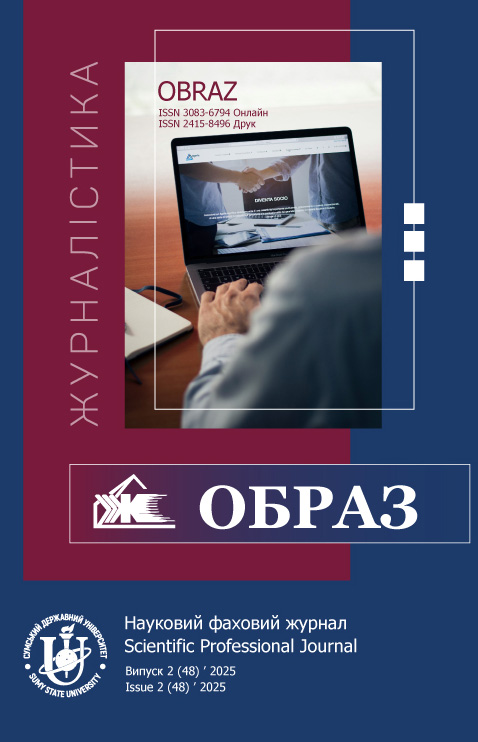Abstract
Introduction. Digital transformation and the rapid advancement of artificial intelligence have necessitated a rethinking of publishing workflows and professional roles in the media industry. Traditional content production models are increasingly giving way to algorithmic and hybrid formats.
Relevance and Aim. The relevance of this study lies in the need to design an innovative model of media producing that responds to the challenges of the digital era, particularly the integration of AI into key stages of the production cycle and the related changes in competence requirements for media producers. A special focus is placed on the Ukrainian context, where the profession of media producer is still in the process of formation.
Methodology. The research applied systems, comparative, and content analysis of educational programs and job descriptions; case analysis of practices of global and local publishing and media organizations (Springer Nature, Elsevier, Bloomberg, “#Naukaprosto”); and qualitative analysis of expert survey involving specialists in digital media producing.
Results. The study identified the main directions of transformation associated with AI integration into publishing processes: automation of content creation; optimization of distribution and personalization; and restructuring of the media producer’s role from coordinator to “human-algorithm” integrator. A conceptual model of media producing was characterized, and critical competences of the modern media producer were highlighted: prompt engineering, hybrid team management, AI-based decision-making, and ensuring the ethicality of automation. Based on a SWOT analysis, conclusions were summarized regarding the advantages and limitations of implementing the innovative model of media producing with AI integration into publishing processes. Further research directions were outlined, particularly aimed at minimizing risks and addressing deficiencies.
Conclusions. The proposed model defines the media producer as a strategic integrator of technological, creative, and managerial solutions, ensuring efficiency and responsible use of AI. The findings have both conceptual and practical significance, particularly for the adaptation of educational programs and the development of ethical regulatory mechanisms in Ukraine’s publishing industry.
References
1. Anantrasirichai, N., Bull, D., Wilkinson, T., & Nightingale, N. Artificial intelligence in creative industries: Advances prior to 2025 [Electronic resource] // arXiv. – 2025. – Access mode: https://arxiv.org/abs/2501.02725 (date of access: 13.06.2025).
2. Broussard, M. Artificial Unintelligence: How Computers Misunderstand the World [Monograph] // Cambridge, MA: MIT Press. – 2018. – 248 p. – ISBN 978-0-26-203800-3.
3. Diakopoulos, N. Automating the News: How Algorithms Are Rewriting the Media [Monograph] // Cambridge, MA: Harvard University Press. – 2019. – 336 p. – ISBN 978-0-674-97698-6.
4. Krainikova, T. S., & Ryzhko, O. M. Biznes-komunikatsii knyzhkovykh vydavnytstv: vid sotsialnykh merezh do metaversytu [Business communications of book publishers: from social media to the metaverse] [Electronic resource] // Obrii drukarstva. – 2023. – № 2(14): 127–135. – Access mode: https://doi.org/10.20535/2522-1078.2023.2(14).295266 (date of access: 13.06.2025).
5. Ma, Y. Exploring the Problems of Applying Intelligent Media in Chinese Journalism Based on the Perspective of Artificial Intelligence [Electronic resource] // SHS Web of Conferences. – 2023. – Vol. 174: 2008. – Access mode: https://doi.org/10.1051/shsconf/202317402008 (date of access: 13.06.2025).
6. Nassar, S. AI and algorithms tackling the media and creative industries [Electronic resource] // Arab Media & Society. – 2024. – Issue 37. – Access mode: https://doi.org/10.70090/SN24AIAT (date of access: 13.06.2025).
7. Packer, H. AI needed to help publishers cope with rising research quantity [Electronic resource] // Times Higher Education. – 23.04.2025. – Access mode: https://www.timeshighereducation.com/news/ai-needed-help-publishers-cope-rising-research-quantity (date of access: 13.06.2025).
8. Razack, H. I. A., Mathew, S. T., Saad, F. F. A., & Alqahtani, S. A. Artificial intelligence-assisted tools for redefining the communication landscape of the scholarly world [Electronic resource] // Science Editing. – 2021. – Vol. 8, no. 2: 134–144. – Access mode: https://doi.org/10.6087/kcse.244 (date of access: 13.06.2025).
9. Ryzhko, O., Krainikova, T., Vodolazka, S., & Sokolova, K. Generative AI changes the book publishing industry: Reengineering of business processes [Electronic resource] // Communication & Society. – 2024. – Vol. 37, no. 3: 255–271. – Access mode: https://doi.org/10.15581/003.37.3.255-271 (date of access: 13.06.2025).
10. Ryzhko, O., Krainikova, T., Vodolazka, S., & Sytnyk, O. Shchuchnyi intelekt u mediakh: navchalnyi posibnyk [Artificial intelligence in media: textbook] [Monograph] // Kyiv: Morpheus. – 2025. – 240 p. – ISBN:978-617-8400-22-4.
11. Salani, J., & Tapfuma, M. Artificial intelligence transforming the publishing industry: A case of the book sector in Africa [Electronic resource] // Frontiers in Research Metrics and Analytics. – 2025. – Access mode: https://doi.org/10.3389/frma.2025.1504415 (date of access: 13.06.2025).
12. Sytnyk, O. Problematyka vprovadzhennia shtuchnoho intelektu v suchasnykh ZMI ta mediatekhnolohii [Problems of implementing artificial intelligence in modern media and media technologies] [Electronic resource] // Ukrainskyi informatsiinyi prostir [Ukrainian Information Space]. – 2023. – № 2(12): 252–265. – Access mode: https://doi.org/10.31866/2616-7948.2(12).2023.291187 (date of access: 13.06.2025).
13. Sytnyk, O. V. Reinzhyniring vydavnychoi industrii yak naslidok vprovadzhennia tekhnolohii shtuchnoho intelektu [Reengineering of the publishing industry as a consequence of AI technology implementation] [Electronic resource] // Vcheni zapysky Tavriiskoho natsionalnoho universytetu imeni V. I. Vernadskoho. Seriia: Filolohiia. Zhurnalistyka [Scientific Notes of Tavria National University named after V. I. Vernadsky. Series: Philology. Journalism]. – 2024. – Vol. 35, no. 6: 335–346. – Access mode: https://doi.org/10.32782/2710-4656/2024.6/52 (date of access: 13.06.2025).
14. Túñez-López, J.-M., Fieiras-Ceide, C., & Vaz-Álvarez, M. Impact of Artificial Intelligence on Journalism: transformations in the company, products, contents and professional profile [Electronic resource] // Communication & Society. – 2021. – Vol. 34, no. 1: 177–193. – Access mode: https://doi.org/10.15581/003.34.1.177-193 (date of access: 13.06.2025).
15. ppiMedia GmbH. AI and Journalism: Opportunities, Tools and Technologies [Electronic resource] // ppiMedia GmbH. – 2024. – Access mode: https://ppimedia.de/en/ai-and-journalism-opportunities-tools-and-technologies/ (date of access: 13.06.2025).
16. PwC Global Entertainment & Media Outlook PwC Global Entertainment & Media Outlook 2024–2028 [Electronic resource] // PricewaterhouseCoopers. – 2024. – Access mode: https://www.pwc.com/outlook (date of access: 13.06.2025).
17. WIPO Technology Trends WIPO Technology Trends 2019: Artificial Intelligence [Electronic resource] // World Intellectual Property Organization. – 2019. – Access mode: https://www.wipo.int/publications/en/details.jsp?id=4386 (date of access: 13.06.2025).

This work is licensed under a Creative Commons Attribution 4.0 International License.

